Four innovative technologies from the U.S. Department of Energy’s (DOE) Lawrence Berkeley National Laboratory (Berkeley Lab) have been honored with a 2023 R&D 100 Award. The award, presented by R&D Magazine and selected by an independent panel of judges, recognizes the year’s 100 most innovative and disruptive technology products from industry, academia, and government-sponsored research. For the first time this year, R&D Magazine presented Professional Awards to individuals and teams. In this new category, Ashok Gadgil received the 2023 R&D Leader of the Year Award and the Energy Management System team received the 2023 R&D Team of the Year.
Berkeley Lab’s winning technologies improve research tools, generate green hydrogen, provide software tools for materials discovery, and figure out the future of charging stations for electric vehicles. The winning teams will be celebrated at the R&D 100 gala banquet in San Diego on November 16, 2023.
Below are descriptions of the technologies:
Getting clearer “view” with novel superconducting nanotips
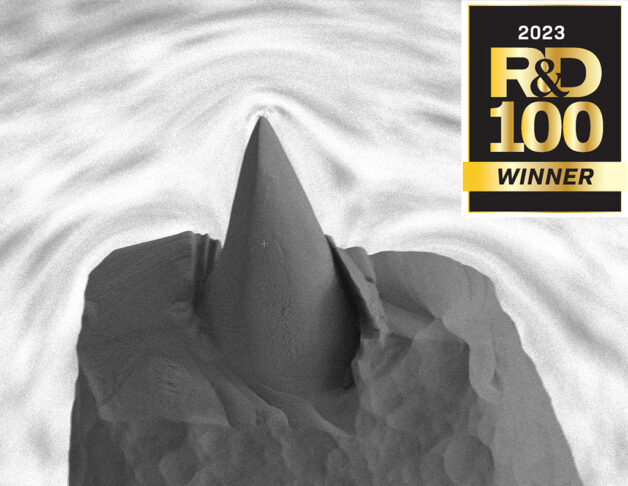 Building the next generation of quantum technologies begins with understanding how novel materials work at the nano-scale. While electron spectroscopy and microscopy tools allow researchers to “see” the structure and composition of these materials, their resolution is hampered by a phenomenon called “energy spread” of the probing electron beam. Berkeley Lab researchers have invented the Cryo-FE, a novel electron emitter that reduces this effect by 10-20 times. The device consists of a superconducting nanotip that leverages resonant quantum states forming at the apex and the cryo temperatures to produce an electron beam with an unprecedentedly narrow energy distribution. The Cryo-FE’s emission can be tuned with an applied electric field to achieve an extremely monochromatic, bright, and coherent electron beam, surpassing the best technologies currently available. This advancement can enable new discoveries in materials science and novel high-resolution tools for spectroscopy and microscopy.
Building the next generation of quantum technologies begins with understanding how novel materials work at the nano-scale. While electron spectroscopy and microscopy tools allow researchers to “see” the structure and composition of these materials, their resolution is hampered by a phenomenon called “energy spread” of the probing electron beam. Berkeley Lab researchers have invented the Cryo-FE, a novel electron emitter that reduces this effect by 10-20 times. The device consists of a superconducting nanotip that leverages resonant quantum states forming at the apex and the cryo temperatures to produce an electron beam with an unprecedentedly narrow energy distribution. The Cryo-FE’s emission can be tuned with an applied electric field to achieve an extremely monochromatic, bright, and coherent electron beam, surpassing the best technologies currently available. This advancement can enable new discoveries in materials science and novel high-resolution tools for spectroscopy and microscopy.
The development was performed by Alexander Stibor and Cameron Johnson.
Cost-effective and clean hydrogen production with molten catalysis
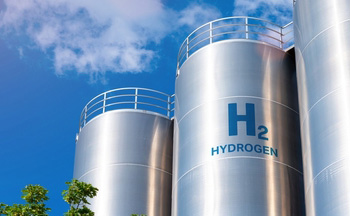 Hydrogen as a new fuel is critical to decarbonizing our economy and reducing our environmental impact. However, many processes that produce hydrogen also produce carbon dioxide (CO2), a known greenhouse gas. A team of Berkeley Lab researchers has improved a process called methane pyrolysis to produce hydrogen and carbon without CO2 emissions. The researchers developed a ternary-liquid-metal-catalyst for methane pyrolysis. Their new “multi-catalyst” could simultaneously perform with high efficiency, selectivity, and durability for methane pyrolysis at mild temperatures (450-800 oC). Most importantly, this new catalyst can be easily fabricated using non-precious metal elements, making it both scalable and cost-effective for industrial use. The technology was filed for US patent application (Homogeneous Ternary Liquid Metal System for Clean Hydrogen Production – Intellectual Property Office) and the core science understanding was accepted in journal Science.
Hydrogen as a new fuel is critical to decarbonizing our economy and reducing our environmental impact. However, many processes that produce hydrogen also produce carbon dioxide (CO2), a known greenhouse gas. A team of Berkeley Lab researchers has improved a process called methane pyrolysis to produce hydrogen and carbon without CO2 emissions. The researchers developed a ternary-liquid-metal-catalyst for methane pyrolysis. Their new “multi-catalyst” could simultaneously perform with high efficiency, selectivity, and durability for methane pyrolysis at mild temperatures (450-800 oC). Most importantly, this new catalyst can be easily fabricated using non-precious metal elements, making it both scalable and cost-effective for industrial use. The technology was filed for US patent application (Homogeneous Ternary Liquid Metal System for Clean Hydrogen Production – Intellectual Property Office) and the core science understanding was accepted in journal Science.
The development team led by Ji Su includes Luning Chen, Shuchen Zhang, Zhigang Song, Gabor A Somorjai, Miquel Salmeron, David Prendergast, Chaochao Dun, Jeff Urban, Jinghua Guo, Xinxin Peng, Yu-Chun Chuang, Chung-Kai Chang, Jeng-Lung Chen
AI analysis pipeline for materials discovery
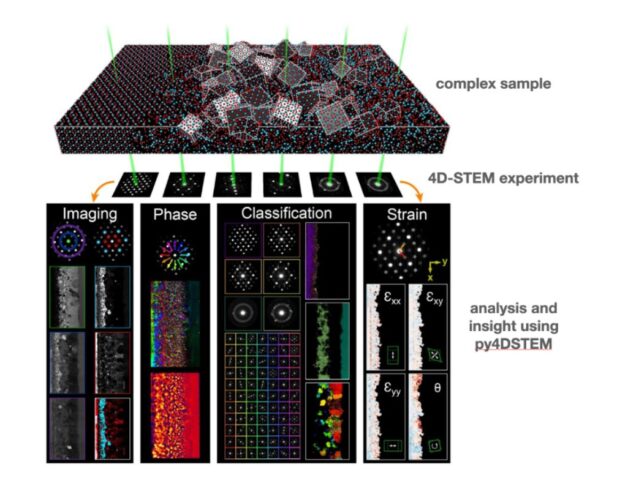 From microelectronics to environmental contamination, scanning transmission electron microscopy (STEM) allows researchers to characterize atomic-scale structures. The new generation of 4-dimensional STEMs (4D-STEM) detectors produce datasets of millions of images filled with information about material properties such as local structure, phase, orientation, and deformation. This is a wealth of information, but also a challenge to analyze. Berkeley Lab scientists have developed a software tool that combines several analysis tools with deep learning algorithms to harness this wealth of information. The open source software tool, called py4DSTEM, allows the user to choose between different characterization modes and provides pathways for effective analysis. With this new tool, researchers can accelerate their research on materials for the next generation of technology.
From microelectronics to environmental contamination, scanning transmission electron microscopy (STEM) allows researchers to characterize atomic-scale structures. The new generation of 4-dimensional STEMs (4D-STEM) detectors produce datasets of millions of images filled with information about material properties such as local structure, phase, orientation, and deformation. This is a wealth of information, but also a challenge to analyze. Berkeley Lab scientists have developed a software tool that combines several analysis tools with deep learning algorithms to harness this wealth of information. The open source software tool, called py4DSTEM, allows the user to choose between different characterization modes and provides pathways for effective analysis. With this new tool, researchers can accelerate their research on materials for the next generation of technology.
The development team led by Colin Ophus includes Benjamin Savitzky, Steven Zeltmann, Alexander Rakowski, Stephanie Ribet, and Georgios Varnavides.
HEVI-LOAD: A tool for projecting infrastructure needs for medium and heavy-duty electric vehicles
 As the decarbonization of the transportation sector continues, government agencies, transportation planners, private clean energy practitioners, and medium and heavy-duty (MHD) electric vehicle drivers are wondering what kind of infrastructure will be needed and where it will be needed. Berkeley Lab scientists have developed a tool to help answer these and related questions: Medium- and Heavy-Duty Electric Vehicle Infrastructure – Load Operation and Deployment (HEVI-LOAD). HEVI-LOAD is a software tool that helps predict the needs of MHD electric vehicles. Its projections include requirements for the electric grid and charging infrastructure such as the type, number, and location of charging stations for the state of California and beyond. The data is visualized and presented in a dashboard application that allows the user to view large and small results down to the county level. The tool has been supported by the California Energy Commission and the US Department of Energy, Vehicle Technology Office’s Analysis Program.
As the decarbonization of the transportation sector continues, government agencies, transportation planners, private clean energy practitioners, and medium and heavy-duty (MHD) electric vehicle drivers are wondering what kind of infrastructure will be needed and where it will be needed. Berkeley Lab scientists have developed a tool to help answer these and related questions: Medium- and Heavy-Duty Electric Vehicle Infrastructure – Load Operation and Deployment (HEVI-LOAD). HEVI-LOAD is a software tool that helps predict the needs of MHD electric vehicles. Its projections include requirements for the electric grid and charging infrastructure such as the type, number, and location of charging stations for the state of California and beyond. The data is visualized and presented in a dashboard application that allows the user to view large and small results down to the county level. The tool has been supported by the California Energy Commission and the US Department of Energy, Vehicle Technology Office’s Analysis Program.
The development team led by Bin Wang includes Wanshi Hong, Cong Zhang, Fan Tong and Douglas Black.
Inaugural R&D 100 Professional Awards winners
In addition to recognizing the year’s 100 most innovative and disruptive technologies, R&D Magazine awarded this year R&D 100 Professional Awards. This award honors exceptional leaders and teams for their achievements in R&D. One team and one scientist from Berkeley Lab have been awarded with this honor this year.
Ashok Gadgil receives R&D Leader of the Year Award
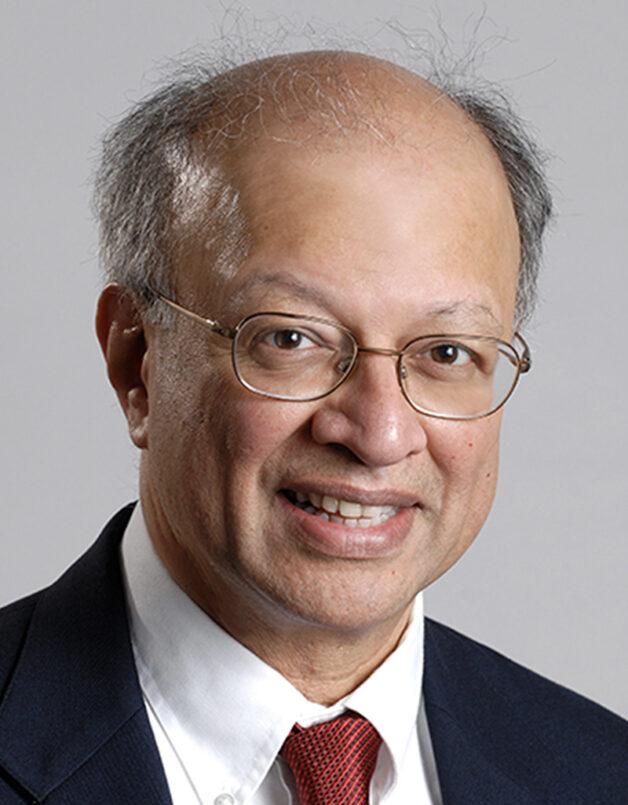 Ashok Gadgil receives the R&D Leader of the Year Award for his more than 30 years of dedication to creating technological innovations for safe drinking water, clean air, sustainable energy, and reduced child mortality. His work has benefited the health and dignity of low-resource communities throughout the years. In addition to his innovative work, he has worked tirelessly to implement his solutions nationally and internationally. Throughout his career, he has mentored numerous students, directed a national laboratory research division, led a binational clean water-energy technology research organization, directed a university development impact lab, and developed and taught courses at UC Berkeley.
Ashok Gadgil receives the R&D Leader of the Year Award for his more than 30 years of dedication to creating technological innovations for safe drinking water, clean air, sustainable energy, and reduced child mortality. His work has benefited the health and dignity of low-resource communities throughout the years. In addition to his innovative work, he has worked tirelessly to implement his solutions nationally and internationally. Throughout his career, he has mentored numerous students, directed a national laboratory research division, led a binational clean water-energy technology research organization, directed a university development impact lab, and developed and taught courses at UC Berkeley.
Energy Management Systems Team receives R&D 100 Professional Team of the Year Award
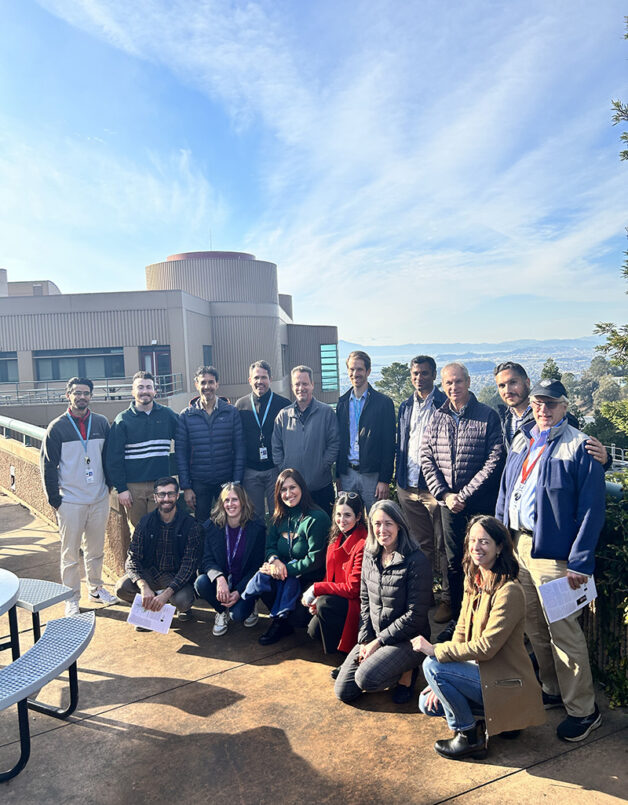 The Energy Management Systems Team receives the R&D 100 Professional Team of the Year Award from R&D World for its ongoing international efforts to advance energy management business practices in the commercial, manufacturing, and institutional sectors. The team has collectively built on each other’s strengths to make a profound impact in their respective fields. By leveraging their diverse academic and personal backgrounds, the team has created a technical program that reaches people working in all sectors of the economy. The team has published international standards, conducted original research, delivered technical assistance to organizations globally, developed professional workforce certification programs, and partnered with private and public sector organizations to accelerate the deployment of energy management business practices. The team’s resources and practices have been adopted by tens of thousands of organizations worldwide, including large and small manufacturers, regional hospital groups, government agencies, schools and universities, and corporate and boutique hotel chains. To learn more about energy management system business practices, visit 50001Ready.lbl.gov.
The Energy Management Systems Team receives the R&D 100 Professional Team of the Year Award from R&D World for its ongoing international efforts to advance energy management business practices in the commercial, manufacturing, and institutional sectors. The team has collectively built on each other’s strengths to make a profound impact in their respective fields. By leveraging their diverse academic and personal backgrounds, the team has created a technical program that reaches people working in all sectors of the economy. The team has published international standards, conducted original research, delivered technical assistance to organizations globally, developed professional workforce certification programs, and partnered with private and public sector organizations to accelerate the deployment of energy management business practices. The team’s resources and practices have been adopted by tens of thousands of organizations worldwide, including large and small manufacturers, regional hospital groups, government agencies, schools and universities, and corporate and boutique hotel chains. To learn more about energy management system business practices, visit 50001Ready.lbl.gov.
The team includes Amy Pevzner, Ana Comesaña, Arian Aghajanzadeh, Bunmi Adesola, Christopher Payne, Graziella Siciliano, Heidi Fuchs, Natalie Sherman, Nick Karki, Paul Sheaffer, Peter Therkelsen, Prakash Rao, Rory Schmick, Sergio Dias, Vestal Tutterow, Vi Rapp, William Miller.
For information about licensing the above technologies, contact [email protected].
# # #
Founded in 1931 on the belief that the biggest scientific challenges are best addressed by teams, Lawrence Berkeley National Laboratory and its scientists have been recognized with 14 Nobel Prizes. Today, Berkeley Lab researchers develop sustainable energy and environmental solutions, create useful new materials, advance the frontiers of computing, and probe the mysteries of life, matter, and the universe. Scientists from around the world rely on the Lab’s facilities for their own discovery science. Berkeley Lab is a multiprogram national laboratory, managed by the University of California for the U.S. Department of Energy’s Office of Science.
DOE’s Office of Science is the single largest supporter of basic research in the physical sciences in the United States, and is working to address some of the most pressing challenges of our time. For more information, please visit energy.gov/science.
